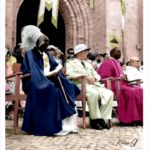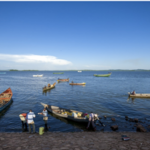The Court’s Growing Alliance with the Germans
The visit of the Duke of Mecklenburg symbolized rising German interest in Rwanda and marked a turning point in relations between the Court and the Germans. Since the establishment of the protectorate, the German presence had been limited in extent and intention. Each of the military posts at either end of Lake Kivu had had only one European officer—sometimes not even one was present—and a small number of East African troops. The military were to prevent any infringements on German territory from the neighboring Belgian and English colonies and to keep the peace; they were not to intervene in local political affairs. The civil administration, represented informally by Kandt, usually took a stand in internal affairs only at the request of the mwami or after great pressure from the missionaries. The soldiers had required labor and supplies from the Rwandans in their vicinity, as had traveling officials, but even these material demands had not seriously burdened the Rwandans or offended the Court.
While the costs of the German presence had not been excessive, the advantages had been substantial, providing the Court with support against rebellious subjects and over-assertive missionaries. Several months after the duke had left, the knowledgeable Kandt was officially named Resident, replacing von Grawert. After assuming office on December 31, 1907, Kandt began planning for his new capital at Kigali in the center of Rwanda. Musinga recognized that an administrative center in the heart of the kingdom would mean more intensive European control, thus altering the balance between the costs and benefits of association with the Germans. For the first time in his relations with Kandt, he sent him the cow and calf that customarily accompanied the request of a mugaragu to his shebuja, asking the new Resident not to constructthe capital at Kigali. Kandt refused the request and pushed ahead with his plans.
The vast requisitions of labor and materials for building the town first demonstrated the greater interference with Rwandan life that Musinga had feared. To create the orderly though small capital he wanted, Kandt made use of 32,000 work days for construction and another 28,000 for transport, mostly for wood from the distant forests of Bushiru. The construction workers received a minimal salary, while the porters received nothing. When the post of Gisenyi was being developed into a town a year later, labor was also obligatory and unpaid, although there then existed regulations forbidding such a procedure.Kandt continued to allow caravans of traders to appropriate their supplies en route, as did all officials of the administration. As Kigali grew into a market center, the number of trade caravans increased. In 1910, 2,117 caravans with more than 20,000 men came to Kigali; the Rwandans had to provide all these men with food, water, and firewood. In 1911 the Resident recognized that this burden was excessive and ordered traders to pay for their supplies. Given the lack of supervision by the Germans, probably few actually did so.
Except for Kandt, none of the Germans who served in Rwanda seriously tried to learn Kinyarwanda or to study Rwandan customs. Their ignorance and their way of life as colonial officers cut them off from what was taking place around them. Their resulting impatience when orders were not efficiently executed often led them to resort to force, which they believed to be a language easily understood by all. The policy only aggravated matters. As their demands increased in number, so did the occasions when they were not fully or promptly met, and so did the number of resulting punitive attacks on Rwandans.
Subordinates of the Germans, like the followers of the Fathers, frequently abused the authority given them by their superiors. One of the worst cases took place in Bugoyi when government soldiers killed four Hutu, injured many more, and devastated a large area in their attempts simultaneously to requisition laborers and to make a profit for themselves. The victimized Hutu appealed to the Fathers at Nyundo, who intervened for them with the commanding German officer at Gisenyi. The commanding officer was so horrified by what he learned in investigating the affair that he publicly reprimanded his second in command, also a German, who had supposedly been supervising the soldiers. This dismal affair ended with the junior officer going into the woods and shooting himself.
However, relatively few Rwandans were so fortunate as to have missionaries in the vicinity to come to their defense. The great majority had no choice but to obey orders or to flee. Occasionally the victims were pushed beyond the limit of endurance and took their own revenge. Such was the case in the northwestern province of Kivuruga, where a soldier raped a girl and then held her for ransom. The fiancé and kinsmen of the girl killed the soldier. While acknowledging that the soldier had committed a crime, Kandt felt that he must uphold German prestige by punishing those who had killed him. Realizing, however, that the ignorance of the local officials made it impossible for them to discover the actual killers, Kandt authorized an attack that destroyed the homes and crops of the entire region.
As the mission stations had done before them, the German posts spawned a great number of pretended employees who exploited their fellow Rwandans. One of the most ambitions operated in an area near the northwestern mission of Murunda where few Europeans ever passed. Aware that the Germans were beginning to build roads in other parts of Rwanda, this entrepreneur claimed to be authorized to construct a road across the region. His persuasive powers were so great that he mobilized the needed workers and materials and did indeed build a small road. He carried his enterprise a step further by then seeking out the Europeans to get his reward but learned to his dismay that in European eyes an enterprising spirit did not excuse misappropriation of authority.
Unlike the Fathers, the Germans involved themselves little with conflicts among Rwandans even after the establishment of the Residency. Concern for maintaining the authority of the Court and notables both limited the number of cases they agreed to hear and dictated that many of their decisions in conflicts between notables and subjects favor the notables. Kandt stated the official position in 1911: “The policy of the Imperial Government and therefore of its Residency is based upon up-holding and strengthening the authority of the Princes and the Sultan under all circumstances, even when in the process the Wahutu must suffer injustice.”Except when pressed particularly hard by the missionaries to hear a case, the Germans generally insisted that all affairs be judged first by notables and be brought to them only on appea1.The Hutu rarely sought German assistance, partly because of their known prejudice for the notables, partly because of language difficulties: all conversation had to pass through an interpreter, who could easily be bought by the notables with their greater resources.In addition, allRwandans associated the Germans with arbitrary and unreasonable use of force: as one Father wrote, “They fear Kigali like the devil.” The small number of civilian administrators —there were only five at the most—also served to make their impact on local disputes relatively light and geographically limited.
Kandt and his successors reserved the right to intervene in any case when they thought the principles of equity were being violated, but in general they tried to effect changes in the judicial process by acting through the mwami. In 1911 the Resident persuaded Musinga to ban the use of certain forms of torture. The mwami traditionally had had the power to prohibit the taking of vengeance by the kin of a man who had been killed; the Germans encouraged Musinga to exercise this power with increasing frequency, especially when the killing had been accidental. When the mwami was slow to act or when it seemed his order would not be obeyed, the Germans sometimes stepped in to protect an accused killer. In some cases they executed those who had disobeyed the mwami’s decree forbidding vengeance. The Germans also attempted to discourage use of execution as a political tool by the Court. They occasionally protected important notables who were in danger, and they tried unsuccessfully to require Musinga to obtain their approval before condemning a man to death. Since no administrator lived at Nyanza, the mwami remained free to execute whom he wished, although he apparently ordered the killings done less publicly than they had been before the establishment of the Residency.
Relatively respectful of royal authority in matters concerning only Rwandans, the Germans were less so in affairs related to their own interests or those of other foreigners. In 1911 the interim Resident Gudovius became impatient with the complexities of the traditional system and the resistance to orders of some of the notables. He began experimenting with the appointment of “Government chiefs” (Regierungsamtwale) who would see to the efficient implementation of his commands and act as intermediaries between Rwandans and strangers traveling through the area. After suppressing a rebellion in northern Rwanda in 1912, Gudovius also decided to appoint a few “reliable” notables to traditional positions of command. For his first “government chief,” Gudovius chose Rwamaga to rule in Mutara (in the northeast); for his first appointment of a mutware, he selected Biganda to command part of Mulera (in the north). Gudovius may have named several others to positions of power but certainly not many. He also obtained Musinga’s approval prior to making the appointments. In 1913 German officers atGisenyi tried naming converts to be chefs du bunetsi, or “chiefs of forced labor,” and briefly used government soldiers to command hills near their post. Meant to expedite requisitions, both attempts failed, and the Germans returned to a policy of leaving commands in the hands of traditional leaders. None of these innovations affected enough people or lasted long enough to disrupt the traditional system, but they did indicate a growing European tendency to make changes which could sap the power of the Court.
In 1911 Kandt first informed Musinga that the Germans were considering imposing a head tax in Rwanda. The year before, they had begun collecting a tax by homes in the trading centers around their posts, but this tax had affected primarily foreigners since few Rwandans lived in the towns. Nonetheless, Musinga immediately recognized the danger of the proposal: to pay a tax was to acknowledge submission to a superior; and those who took the Germans as their superiors could use the protection of the foreigners to escape from obligations to traditional rulers, including the mwami himself. Musinga secretly summoned one of Kandt’s most trusted employees and pleaded with him to have Kandt postpone imposing the tax. Whether the mwami’s arguments carried great force with the Resident or whether Kandt was simply limited by his lack of personnel, he did nothing more about the proposal. Indeed, Musinga later claimed that Kandt had promised that he would not begin taxation until 1920.
Kandt’s replacement, Captain Wintgens, either respected royal authority less or needed the revenue more than his predecessor. Whatever his motive, in June 1914 he ordered the tax collected from those Rwandans who lived near the administrative centers of Kigali, Gisenyi, and Cyangugu. Approximately 150,000 Rwandans paid the one rupee charge for themselves and their immediate famines. Musinga had tried to minimize the political effect of such a tax by persuading the Germans to allow his notables to collect it for them, thus reinforcing Court powers. With such an arrangement, the Hutu would have seen that the notables still stood between them and the Germans and so would have been less likely to seek German assistance in escaping traditional obligations. It would also have given the notables and Court an opportunity to profit from the tax themselves. Wintgens refused this plan and used his own subordinates for the collection. Musinga persisted, however, eager to draw some return from the unfortunate development, ordering his notables to collect tax in regions not covered by the German collectors. The Germans learned of this effort, which was successful in some areas,only when Hutu near the Rwaza mission complained to the Fathers about this new imposition.
Wintgens reported with satisfaction that “One can even speak of joy of payment” among those who came to give their rupees to the government. Like Musinga, he believed that the Hutu paid willingly because they expected the Germans would in the future “protect them against the despotism and injustice of the Tutsi.” Despite Musinga’s fears and Wintgens’s cheerful analysis, hope for protection against the notables was not the sole motivation for payment. Because those who paid were those who lived nearest the German posts, they were the same people who had most often been forced to work for the Europeans, generally without remuneration. Many Hutu assumed, and some were explicitly promised by German officers, that payment of the tax would exempt them from any future obligatory labor. Since the amount of the tax apparently freed them from the burdens spent laboring for the Germans, they naturally paid the tax with enthusiasm.
https://uk.amateka.net/the-courts-growing-alliance-with-the-germans/https://uk.amateka.net/wp-content/uploads/2023/01/king-kigeli.webphttps://uk.amateka.net/wp-content/uploads/2023/01/king-kigeli-150x150.webpHistory of kingsMissionary historyThe visit of the Duke of Mecklenburg symbolized rising German interest in Rwanda and marked a turning point in relations between the Court and the Germans. Since the establishment of the protectorate, the German presence had been limited in extent and intention. Each of the military posts at either...BarataBarata rpierre@ikaze.netAdministratorAMATEKA | HISTORY OF RWANDA




